Related Research Articles

Kalinga, officially the Province of Kalinga, is a landlocked province in the Philippines situated within the Cordillera Administrative Region in Luzon. Its capital is Tabuk and borders Mountain Province to the south, Abra to the west, Isabela to the east, Cagayan to the northeast, and Apayao to the north. Kalinga and Apayao are the result of the 1995 partitioning of the former province of Kalinga-Apayao which was seen to better service the respective needs of the various indigenous peoples in the area.

Kalinga-Apayao was a province of the Philippines in the Cordillera Administrative Region in the island of Luzon. It was formed, along with Benguet, Ifugao, and the new Mountain Province, from the earlier Mountain Province, with the passage of Republic Act No. 4695 in 1966. The said law was amended by RA No. 7878 in 1995, which divided the province into two new ones, Kalinga and Apayao.
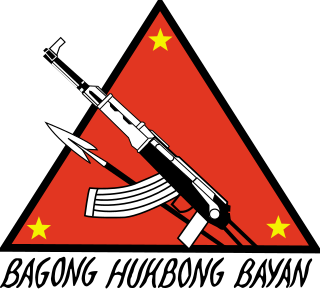
The New People's Army is the armed wing of the Communist Party of the Philippines (CPP). It acts as the CPP's principal organization, aiming to consolidate political power from what it sees as the present "bourgeois reactionary puppet government" and to aid in the "people's democratic revolution". Founded on March 29, 1969, by the collaboration of Jose Maria Sison and former members of the Hukbalahap led by Bernabe Buscayno, the NPA has since waged a guerrilla war based on the Maoist strategy of protracted people's war. The NPA is one of the key figures in the ongoing communist rebellion in the Philippines, the longest ongoing conflict in the country.

The Communist Party of the Philippines is a far-left, Marxist–Leninist–Maoist revolutionary organization and communist party in the Philippines, formed by Jose Maria Sison on 26 December 1968.

Gymkata is a 1985 martial arts film directed by Robert Clouse, based on Dan Tyler Moore's 1957 novel The Terrible Game. It stars Olympic gymnast Kurt Thomas as Jonathan Cabot, an Olympic gymnast who combines his gymnastic ability with martial arts to enter a deadly competition in a fictional country, Parmistan. Supporting cast members includes Tetchie Agbayani as Princess Rubali, alongside Richard Norton, Edward Bell, John Barrett, Conan Lee, Bob Schott and Buck Kartalian.
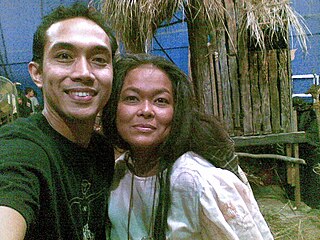
Visitacion Parado, better known by her screen name Tetchie Agbayani, is a Filipino actress, model and psychology instructor. She began her acting career in the film Pepeng Shotgun (1981), following several stints in pageantry and modelling. She was the first and only Filipino woman to appear on the cover of the German edition of Playboy, in 1982. She has starred in numerous Hollywood films such as The Emerald Forest (1985), Gymkata (1985), The Money Pit (1986), Rikky and Pete (1988) and has received accolades at the Metro Manila Film Festival, in addition to nominations for a FAMAS, Gawad Urian, Star Awards for Movies and Luna Awards.

Okay Ka, Fairy Ko! is a Philippine television fantasy sitcom series broadcast by Intercontinental Broadcasting Corporation, ABS-CBN and GMA Network. Directed by Bert de Leon, it stars Vic Sotto, Charito Solis and Alice Dixson. It premiered on November 26, 1987 and concluded on April 3, 1997.

The New People's Army rebellion is an ongoing conflict between the government of the Philippines and the New People's Army (NPA), the armed wing of the Marxist–Leninist–Maoist Communist Party of the Philippines (CPP). It is the most prominent communist armed conflict in the Philippines, with more than 43,000 insurgency-related fatalities between 1969 and 2008. It is also one of the longest ongoing communist insurgencies in the world.
1987 in the Philippines details events of note that happened in the Philippines in the year 1987.
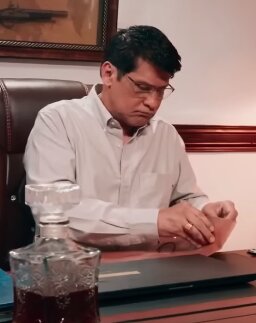
Mariano Calongje de Leon, better known by his stage name Julio Diaz, is a Filipino film and television actor in the Philippines. Diaz is of Filipino Mexican background. He received the Best Actor Gawad Urian Award nomination for his performance in Takaw Tukso (1986).
Renato Chua, professionally known as Rhene Imperial, a former action star, former producer and currently born-again Christian minister in the Philippines.

The history of communist armed conflicts in the Philippines is closely related to the history of communism in the Philippines, with various armed conflict linked to the armed wings of the various communist organizations that have evolved since 1930. The two largest conflicts have been the Hukbalahap rebellion of 1942–1954, and the ongoing rebellion of the New People's Army, which began in 1969 under the auspices of the Communist Party of the Philippines (CPP). But various splinter groups have since separated from the CPP and have had a history of armed conflict with the Philippine government since then.
Communism in the Philippines emerged in the first half of the 20th century during the American colonial era of the Philippines. Communist movements originated in labor unions and peasant groups. The communist movement has had multiple periods of popularity and relevance to the national affairs of the country, most notably during the Second World War and the Martial Law Era of the Philippines. Currently, the communist movement is weaker, and considered an insurgent movement by the Armed Forces of the Philippines.
The following is the timeline of events of CPP-NPA-NDF rebellion, a conflict between the government of the Philippines, the Communist Party of the Philippines (CPP), the New People's Army (NPA) and the National Democratic Front (NDF).
Conrado Balweg was a former Filipino Catholic priest and rebel who was the founder of the Cordillera People's Liberation Army, a militant group which advocated autonomy for the Cordillera region in the Philippines. He was also known by the nom-de-guerreKa Ambo.
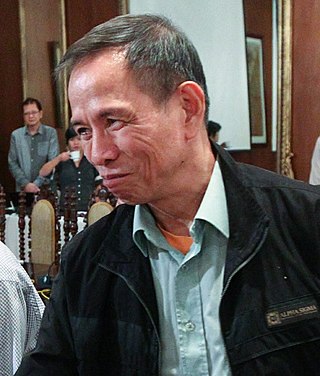
Benito Tiamzon was a Filipino political organizer and until his arrest in March 2014 by Philippine security forces, was believed to be the Chairman of the Communist Party of the Philippines (CPP) and its armed wing, the New People's Army (NPA).

Victor Navarro Corpus was a Filipino military officer and public official best known for his 1970 defection from the Armed Forces of the Philippines (AFP) to the New People's Army of the Communist Party of the Philippines during the authoritarian regime of Ferdinand Marcos, for his defection from the NPA in 1976, his return to the AFP after the 1986 People Power Revolution, and his later role as chief of the Intelligence Service of the Armed Forces of the Philippines (ISAFP).
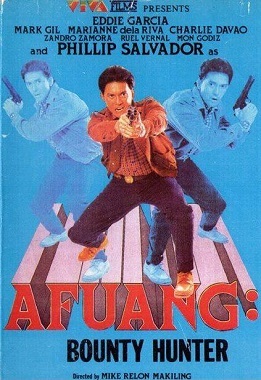
Afuang: Bounty Hunter is a 1988 Philippine biographical action film directed by Mike Relon Makiling. The film stars Phillip Salvador in the title role. The film is based on the life of Abner Afuang, a former police officer who was a Pagsanjan mayor by the time the film was released.
Keith Absalon, a collegiate footballer who played for the FEU Tamaraws in the University Athletic Association of the Philippines (UAAP) and his cousin, Nolven, were killed when they ran over an explosive, reportedly a landmine or an improvised explosive device, that was set up by the New People's Army (NPA) in June 2021 in Masbate City, Philippines.
References
- 1 2 "Tetchie: From Hollywood to Cordilleras". Manila Standard . Standard Publications, Inc. July 4, 1987. p. 15. Retrieved June 1, 2021.
- 1 2 Feria, Mike (July 15, 1987). "Smorgasbord treat: tastes of mediocrity". Manila Standard . Standard Publications, Inc. p. 14. Retrieved June 1, 2021.
A confused and opportunistic film about a confused and opportunistic personality.
- 1 2 "Butch Perez stages a comeback". Manila Standard . Standard Publications, Inc. July 9, 1987. p. 14. Retrieved June 1, 2021.
- ↑ Flores, Monette (July 9, 1988). "Lucky Richard". Manila Standard . Standard Publications, Inc. p. 14. Retrieved June 1, 2021.
- ↑ "Opens Today". Manila Standard . Standard Publications, Inc. July 8, 1987. p. 15. Retrieved June 1, 2021.
Free 'Balweg' T-shirts and stickers will be given away to lucky patrons
- 1 2 Nigago, JC (July 19, 1987). "Film as deodorant". Manila Standard . Standard Publications, Inc. p. 14. Retrieved June 1, 2021.
- ↑ "Primetime Saturday". Manila Standard . Standard Publications, Inc. June 23, 1990. p. 16. Retrieved June 26, 2024.
- ↑ Philippine News and Features (July 18, 1987). "'Balweg': A 'hilarious' movie that 'misinforms'". Manila Standard . Standard Publications, Inc. p. 14. Retrieved June 1, 2021.
- ↑ Feria, Mike (January 12, 1988). "The year of the mediocre". Manila Standard . Standard Publications, Inc. p. 11. Retrieved June 5, 2021.
- ↑ Philippine Almanac Book of Facts 1990. Aurora Publications. 1990. p. 451. ISBN 971-588-000-2 . Retrieved June 5, 2021.
- ↑ CCP Encyclopedia of Philippine Art: Volume VIII - Philippine Film. Cultural Center of the Philippines. 1994. p. 316. ISBN 971-8546-23-5 . Retrieved June 1, 2021.
- 1 2 "Viva Films sweeps 6th FAP awards". Manila Standard . Standard Publications, Inc. May 30, 1988.